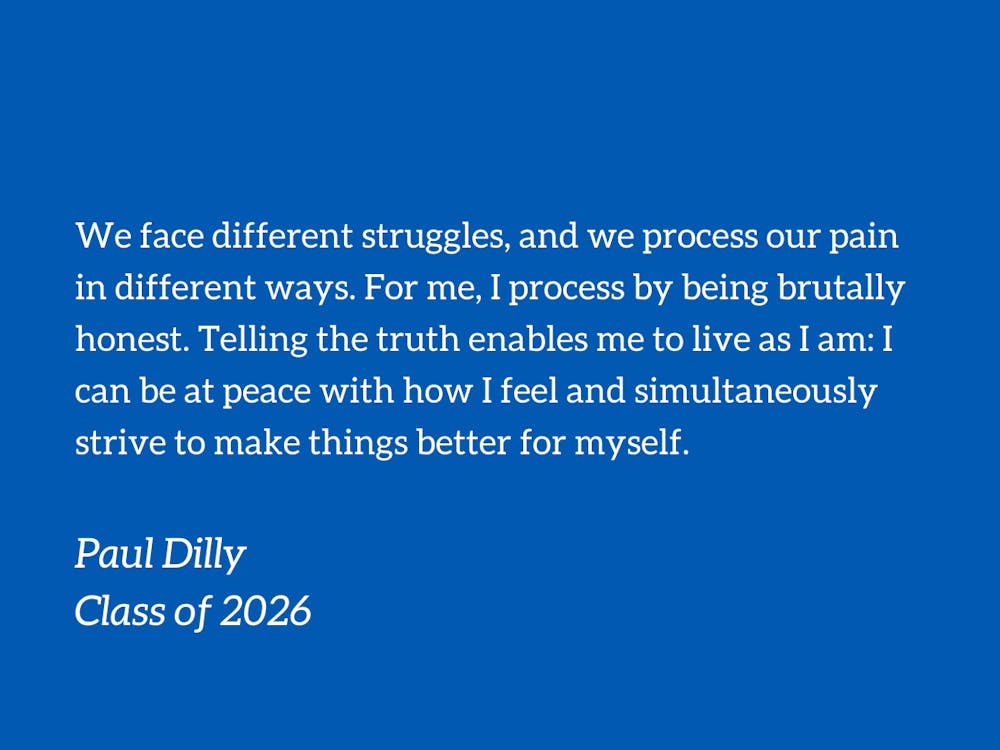Pain defines you — how could it not? It is not you, but it led to you: It contributed to the chain of experiences that got you to this moment. Denying its existence — and its influence — only drives you deeper into its clutches. I know, because I tried to deny it too.
When loved ones asked me how I was doing, I used to be honest: I’m hurting, I’m exhausted and I’m scared that I may always feel this way. And I was all too often met with supposed encouragement like “you’re fine” and “stay positive” or rote advice like “get out more.” It seemed they were brushing off my pain without bothering to try to understand what I was going through. I felt suffocated and isolated by my struggle, and all I wanted was empathy — so it killed me when I didn’t get it. Because then I felt doomed to suffer alone.
As someone who’s wrestled with OCD since the fourth grade, my days are often filled with an invisible war with thoughts I can’t seem to control, let alone suppress. So loud and demanding are they that I feel I have to do their bidding to rid myself of them. If I don’t, they fill my head with unrelenting pressure to bend to their will — to the point where I cannot breathe. My mind seldom feels like my own, and it often uses its power over me to wreck things in which I once found joy. Reading became restless memorization, rereading each page 20 times until I could recite it backwards. Playing sports and running became an unhealthy health obsession, with my new efforts leading to severe anorexia (ironic). And now, school: my love for learning replaced by a pit of expectations, opportunity given way to obligation. I can’t remember what it was like to learn freely, to code up a fun project or write on the side without expecting the next big tech startup or an award-winning book to come of it. (Even as I’m writing this piece, I feel pressure to make it as good as my last one.)
This was (is) my reality. I was fighting hard to make it through each day, and I couldn’t understand why others couldn’t acknowledge that. Searching for an explanation, I churned through the possibilities. Maybe they didn’t know what to say; maybe they also had a tough day and didn’t have the capacity to respond better; or maybe it pained them to see me in pain, so they preferred to pretend I was fine (for their own sake) instead. No matter how much I thought about it, though, I could not find the answer. Thinking it would spare me the interactions I’d come to dread, I decided to start feeding people what they wanted to hear. The next time someone asked how I was, I plastered a Cheshire Cat grin on my face and belted out an enthusiastic “I’m good!” But this act only deepened the wound.
I thought such a lie was quick and shameless — how could five seconds of playing along hurt me? That’s where I was wrong: The pretending didn’t end. So long as I remained in the person’s company, I felt pressure to “live up to” the good life I’d said I had — leading me to fake laughs and good times to pass my own standard. Living these little lies necessitated a constant pretense — being alone was now my only chance to live in truth — which made the reality I came home to that much harder to deal with. Maybe I never had the support I wanted from others. But at least before I had myself. Now I was fleeing from the pain I’d once fought back against.
I cared what others thought of me. Clearly. That’s why I so badly wanted to control their responses to my honesty. That’s why I ultimately let them control me, why I adapted my entire persona for their sake. But what about me? What if I cared what I thought, too? And that’s when the revelation struck: I had framed it all wrong. I had placed so much emphasis on other people because I was speaking for their sake. So instead I tried speaking for mine. I told the truth. Not because I no longer cared what they thought. Not because I wanted to be vulnerable with them. No. I do it because I never want to deny myself again. I do it because it’s a way for me to process and acknowledge the pain I’m facing. I do it because it’s what I need to do — for me.
We face different struggles, and we process our pain in different ways. For me, I process by being brutally honest. Telling the truth enables me to live as I am: I can be at peace with how I feel and simultaneously strive to make things better for myself. The smiles and laughs are no longer forced; I let them flow freely.
Maybe you’re a truth-teller too. Maybe not. Regardless, give yourself what you need to heal. I blamed others for my discontentment — do not make the same excuse. You are the only one who knows what you need; as such, you are the only one who can give it to yourself. Holding to that will suck sometimes — you may have to adjust your priorities, sacrifice other opportunities or leave behind some relationships — but it’s the only way through. Whenever someone hits me with one of those lame replies, I remind myself that I am worth it. I am worth telling the truth. I am worth fighting for. And so are you. Believe it.
Paul Dilly is a Trinity sophomore. His column typically runs on alternate Thursdays.
Get The Chronicle straight to your inbox
Sign up for our weekly newsletter. Cancel at any time.

